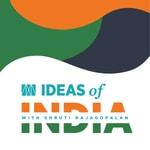Ideas of India – Détails, épisodes et analyse
Détails du podcast
Informations techniques et générales issues du flux RSS du podcast.

Ideas of India
Mercatus Center at George Mason University
Fréquence : 1 épisode/13j. Total Éps: 140

Classements récents
Dernières positions dans les classements Apple Podcasts et Spotify.
Apple Podcasts
🇺🇸 États-Unis - socialSciences
02/08/2025#90🇺🇸 États-Unis - socialSciences
01/08/2025#52🇩🇪 Allemagne - socialSciences
31/07/2025#99🇺🇸 États-Unis - socialSciences
31/07/2025#61🇩🇪 Allemagne - socialSciences
30/07/2025#82🇺🇸 États-Unis - socialSciences
30/07/2025#65🇩🇪 Allemagne - socialSciences
29/07/2025#67🇺🇸 États-Unis - socialSciences
29/07/2025#57🇩🇪 Allemagne - socialSciences
28/07/2025#47🇺🇸 États-Unis - socialSciences
28/07/2025#80
Spotify
Aucun classement récent disponible
Liens partagés entre épisodes et podcasts
Liens présents dans les descriptions d'épisodes et autres podcasts les utilisant également.
See all- https://www.mercatus.org/podcasts
350 partages
- https://takshashila.org.in/
342 partages
- https://seenunseen.in/
129 partages
- https://twitter.com/tylercowen
279 partages
- https://twitter.com/srajagopalan
149 partages
- https://twitter.com/ideasofindia
137 partages
Qualité et score du flux RSS
Évaluation technique de la qualité et de la structure du flux RSS.
See allScore global : 63%
Historique des publications
Répartition mensuelle des publications d'épisodes au fil des années.
Amol Agrawal on the Bankers who Built Modern India
Épisode 113
jeudi 29 août 2024 • Durée 01:24:24
Today my guest is Amol Agrawal, who is the author of History of Private Banking in South Canara District (1906-69). He teaches economics at Ahmedabad University and blogs at the excellent blog Mostly Economics.
We spoke about the colonial and post-colonial history of banking in India, the unique features of the South Canara district, and its bankers, inclusive banking by state and private banks, bank nationalization, and much more.
Recorded July 26th, 2024.
Read a full transcript enhanced with helpful links.
Connect with Ideas of India
Follow Shruti on X
Follow Amol on X
Click here for the latest Ideas of India episodes sent straight to your inbox.
Timestamps
(00:00:00) - Intro
(00:01:21) - History of Private Banking in India
(00:12:06) - Lending and Deposits
(00:16:17) - Industrial Development and Banking
(00:21:24) - Bank Runs in India
(00:25:54) - Success of South Canara Banks
(00:28:38) - Systemic Risk in South Canara
(00:36:16) - Banking Castes?
(00:40:29) - What was the RBI so wrong about with South Canara banking?
(00:47:50) - Pigmy Deposit Scheme
(01:05:28) - Why Were India’s Banks Nationalized?
(01:23:35) - Outro
Amartya Lahiri and Devashish Mitra on Trade and Manufacturing-Led Economic Growth in India
Épisode 112
jeudi 15 août 2024 • Durée 01:36:16
Today my guests are Amartya Lahiri and Devashish Mitra who are joining me to discuss their latest paper for the 1991 project titled India’s Development Policy Challenge. Amartya Lahiri is the Royal Bank Research Professor in the Vancouver School of Economics at the University of British Columbia (UBC). Devashish Mitra the Gerald B. and Daphna Cramer Professor of Global Affairs at the Maxwell School of Citizenship and Public Affairs, Syracuse University. We spoke about structural transformation and increasing total factor productivity, manufacturing versus services led growth, industrial policy, export led growth, how to employ India’s youth in more productive sectors, and much more.
Recorded July 29th, 2024.
Read a full transcript enhanced with helpful links.
Connect with Ideas of India
Follow Shruti on X
Follow Amartya on X
Follow Devashish on X
Click here for the latest Ideas of India episodes sent straight to your inbox.
Timestamps
(00:00:00) - Intro
(00:01:27) - State of India’s Structural Transformation
(00:08:28) - Has India’s Growth Peaked?
(00:15:39) - Trade-, Export-, and Manufacturing-Led Growth
(00:27:50) - Manufacturing-Led or Services-Led Growth Model?
(00:47:16) - Scaling Manufacturing
(00:59:38) - Labor Productivity in India
(01:06:41) - Rising Protectionism
(01:19:44) - Monetary Policy and Trade Policy
(01:35:26) - Outro
Pranay Kotasthane Unravels the Global Semiconductor Industry
Épisode 103
jeudi 11 avril 2024 • Durée 00:00
Today my guest is Pranay Kotasthane who is the deputy director of the Takshashila Institution and chairs the High Tech Geopolitics Programme.
Pranay co-writes Anticipating the Unintended, a newsletter on public policy ideas and frameworks, and co-hosts Puliyabaazi, a popular Hindi-Urdu podcast on politics, policy, and technology. He is the co-author of - Missing in Action: Why Should You Care About Public Policy, and the graphic nonfiction narrative We, the Citizens. He has co-edited India’s Marathon: Reshaping the Post-Pandemic World Order.
Today we are discussing his most recent book, When the Chips Are Down, coauthored with Abhiram Manchi. We spoke the evolution of the semiconductor industry, industrial targeting, Moore’s law, Rock’s law, Taiwan’s Comparative advantage, whether India can lead in semiconductor chips and more.
Recorded March 12th, 2024.
Read a full transcript enhanced with helpful links.
Timestamps
(00:00:00) - Intro
(00:08:35) - Moore's Law
(00:14:08) - Rock's Law
(00:21:41) - Geopolitics of the Semiconducter Industry
(00:27:46) - Metacritical Technologies
(00:38:49) - Geographical Concentration
(00:48:34) - Zelenograd
(00:59:44) - Unease of doing Business in India
(01:09:45) - Industrial Targeting in Taiwan
(01:30:57) - Outro
Connect with Ideas of India
Follow Shruti on X
Follow Pranay on X
Click here for the latest Ideas of India episodes sent straight to your inbox.
Proma Ray Chaudhury on Gender and Women's Political Participation
Épisode 13
jeudi 31 décembre 2020 • Durée 31:47
The fourth scholar in our young scholars series is Proma Ray Chaudhury, a PhD Candidate at the School of Law and Government in Dublin City University under the EU Marie Curie ETN Global India Project, working on gender and women’s political participation in contemporary India. I spoke with Proma about her paper titled, “The Political Asceticism of Mamata Banerjee: Female Populist Leadership in Contemporary India,” where she studies representation of female political leaders, in particular, Mamata Bannerjee in West Bengal.
Full transcript of this episode
Click here for the latest Ideas of India episodes sent straight to your inbox!
Tanu Kumar on the Connection Between Housing Subsidies and Political Activity
Épisode 12
jeudi 24 décembre 2020 • Durée 27:39
For the next few weeks I will be speaking to young doctoral and post-doctoral candidates entering the academic job market and the policy world about their newly minted research on Indian political economy.
The third scholar in our young scholars series, Dr. Tanu Kumar is a postdoctoral fellow at William and Mary’s Global Research Institute. She is a political scientist studying urban politics and service delivery. I spoke with Tanu about her paper, “Home-Price Subsidies Increase Local-Level Political Participation in Urban India,” which has been conditionally accepted at the Journal of Politics. In her paper, Tanu studies the effects of a housing subsidy program in Mumbai through an original survey of winners and nonwinners of program lotteries, and its effect on local political participation.
We also discussed another one of Tanu’s papers, “The Human Capital Effects of Subsidized Government-Constructed Homes in Urban India,” on how this housing subsidy affects long-term investments in human capital.
Full transcript of this episode
Click here for the latest Ideas of India episodes sent straight to your inbox!
Rohit Ticku on Temple Desecrations and Same-Sex Marriage Laws
Épisode 11
jeudi 17 décembre 2020 • Durée 25:52
For the next few weeks I will be speaking to young doctoral and post-doctoral candidates entering the academic job market and the policy world about their newly minted research on Indian political economy.
The next scholar in our young scholar series is of Dr. Rohit Ticku. Rohit is a postdoctoral fellow at the Institute for the Study of Religion, Economics, and Society at Chapman University. He is working on religion, culture and identity from an economic point of view. I spoke with Rohit about his paper, titled Economic Shocks and Temple Desecrations in Medieval India, which is coauthored with Anand Shrivastava and Sriya Iyer, where they show that economic downturns led rules to strategically desecrate temples to quell mass uprisings. I also discussed another one of Rohit’s papers titled Same Sex Marriage Laws and Coming out in America:Theory and Evidence from Catholic Priesthood (coauthored with Avner Seror) on the effect of the same-sex marriage laws on the expression of sexual identity in the United States.
Full transcript of this episode
Click here for the latest Ideas of India episodes sent straight to your inbox!
Vaishnavi Surendra on the Moneylender as Middleman in Rural India
Épisode 10
jeudi 10 décembre 2020 • Durée 28:20
For the next few weeks, I will be speaking to young doctoral and post-doctoral candidates entering the academic and policy works about their newly minted research on Indian political economy. The first scholar in our young scholars’ series is Dr. Vaishnavi Surendra. Vaishnavi is a post-doctoral scholar at University of California, Berkley. She is a development economist working in the area of household finance and her research is focused on studying credit markets in rural India. Today I’ll be speaking with her on her findings on moneylenders in rural India. In her paper titled, “The Moneylender as Middleman: Formal Credit Supply and Informal Loans in Rural India” Vaishnavi demonstrates that informal moneylenders borrow from the formal banking system and lend to households acting as intermediaries to ease lending capital constraints in rural India.
Full transcript of this episode
Click here for the latest Ideas of India episodes sent straight to your inbox!
Adam Auerbach on Slum Residents Demanding Development
Épisode 9
jeudi 26 novembre 2020 • Durée 01:29:48
Shruti talks with Adam Auerbach about competition, creative problem-solving, and formalizing political activity in India’s urban slums.
In this episode, Shruti spoke with Adam Auerbach about his 2019 book, Demanding Development: The Politics of Public Goods Provision in India’s Urban Slums. Auerbach is an assistant professor in the School of International Service at American University. His research interests include local governance, urban politics, and the political economy of development, with a regional focus in South Asia and particularly in India. Shruti also talked with Adam about the ethnic and social diversity of Indian slums, the lack of geographic mobility between those neighborhoods, political representation at the extremely local level, and much more.
Full transcript of this episode enhanced with helpful links: https://www.discoursemagazine.com/tag/ideas-of-india-podcast/
Connect with Shruti on Twitter: https://twitter.com/srajagopalan
Rohit De on the Everyday Life of Law in the Indian Republic
Épisode 8
jeudi 12 novembre 2020 • Durée 01:22:35
Today’s guest is Rohit De, who is an associate professor of history at Yale University. His recent book, A People's Constitution: The Everyday Life of Law in the Indian Republic, is an excellent look at how the constitution actually transformed the daily lives of citizens in profound and lasting ways. Rohit details how those on the margins of society, like butchers and prostitutes, or drinkers and traders, made claims using the constitution after India’s founding and shaped India’s constitutional culture.
I had a chance to speak with Rohit about the four cases he makes in the book. We talked about how individuals asserted their rights against an oppressive, regulatory, and socialist state that had criminalized their daily activities and infringed on their ability to carry on their profession. We also had a chance to talk about Indian constitutionalism, economic planning and controls during the Nehruvian socialism, the meaning of constitutional franchise, constitutional symbolism during the citizenship amendment protests in India, Rohit’s intellectual journey, and much more.
Full transcript of this episode enhanced with helpful links: https://www.discoursemagazine.com/tag/ideas-of-india-podcast/
Connect with me on Twitter: https://twitter.com/srajagopalan
Biju Rao on Democracy, Deliberation, and Development
Épisode 7
jeudi 29 octobre 2020 • Durée 01:20:31
Today my guest is Vijayendra Rao, or as he's known, Biju Rao, a lead economist in the Development Research Group at the World Bank. His recent book coauthored with professor Paromita Sanyal called Oral Democracy: Deliberation in Indian Village Assemblies, is an excellent study of citizens voice in India's Gram Sabhas, or village assemblies, which are also the largest deliberative institution in human history.
I had a chance to speak with Biju about deliberative democracy in India, federalism and local governments, conducting ethnographic research, what it means to be a development economist, the relevance of methodology and history, and much more.
Full transcript of this episode
Follow Biju on Twitter
Click here for the latest Ideas of India episodes sent straight to your inbox!









